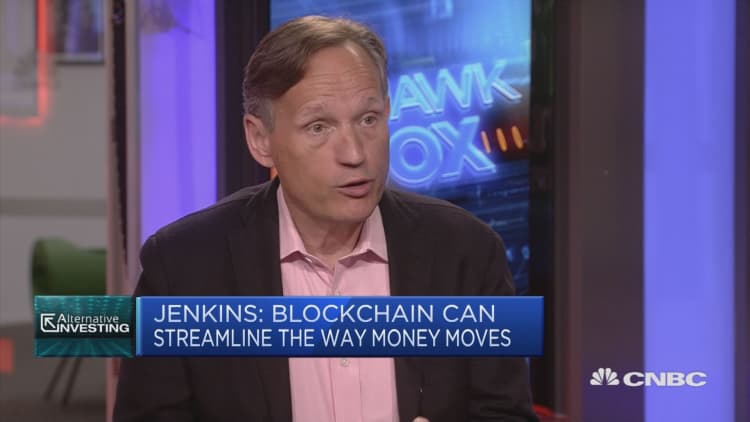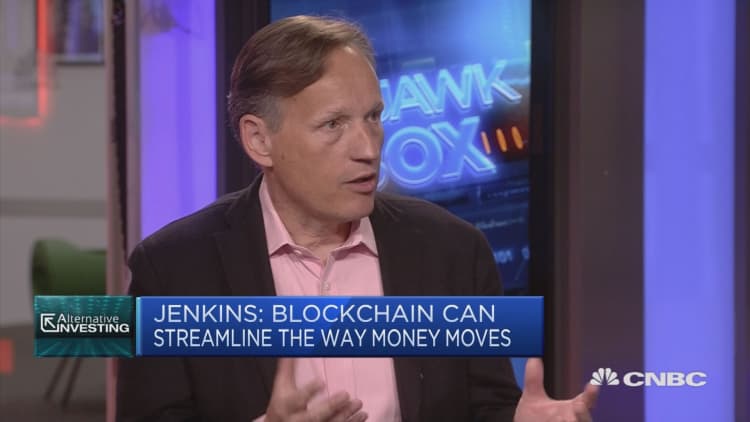
A former Barclays CEO reinforced his warning that big banks may fall behind in the race towards harnessing new financial technologies like blockchain.
Antony Jenkins, who led the bank through a tumultuous period between 2012 and 2015, told CNBC that though banks tended to be good at innovating, they were struggling to transform in the way that outsiders were.
"I think what we see in all industries, especially in financial services, is that incumbents (banks) tend to be quite good at innovation – they throw a lot of resources at that – and then the transformation is much harder for them," Jenkins told CNBC in an interview on Thursday.
He said that big technology firms and financial technology start-ups were dominating the space.
"If you look at all the interesting work on transformation, it's really going outside the big incumbents. And the incumbents themselves are starting to realize this."
On Tuesday, a report by the World Economic Forum found that banks were significantly lagging behind tech giants in the development of technologies like cloud computing, artificial intelligence and big data analytics. The study also concluded that fintech firms failed to disrupt the competitive landscape of the financial services in the way that they had hoped.
Blockchain removes need for middle men
Blockchain records a digital ledger of transactions via a distributed network, thereby ruling out the need for supervision by middle men. Its most common use is for trading cryptocurrencies such as bitcoin.
Barclays' former boss said that the banking system was being held down by the requirement for central authorities.
"If you think about it, if just you and I lived in the world – you had money, I needed money – we'd do that between us. There's billions of people in the world, so we have a banking system," he told CNBC's "Squawk Box".
"But what a banking system does is have a series of centralized counterparties that tend to concentrate on risk. And when you concentrate on risk you have to have a lot of capital underpinning that, and it creates friction in the system."

The former banking executive said that while blockchain began as a fringe technology, ignored by mainstream financial services, its true potential is coming close to being realized.
"I think this is like all technological developments we see. It starts off quite small and on the periphery of life, and most incumbent players – in this case the banks – tend to ignore it and sort of hope it will go away. And then they begin to pay attention to it and do a few experiments in it," he said.
"But meanwhile, the real learning and knowledge is being built off to the side here."
On Tuesday, IBM announced it would allow food giants like Nestle, Unilever and Wal-Mart to use its blockchain network to track information about the origin, condition and movement of food.
Mortgages, credit granted within minutes
Jenkins added that distributed ledger technology could result in mortgages and credit being issued to customers in a matter of minutes.
"Over time what you could see for example, is a mortgage being granted in 10 minutes, you could see a letter of credit being granted in two minutes, those types of things," he said.
"And while we're not there yet, we will be there over the coming five, ten, fifteen years, and that has the effect of squeezing out a huge amount of margin and profit for the banking system, which is basically made out of inefficiency."

In June the business leader said that banks and become "as common as a Blockbuster video store" if they failed to keep up with the pace of rapidly evolving financial technologies.
He said that the opportunities produced by digital ledgers could result in efficiency savings of between $80 billion-$110 billion.
In 2015, Jenkins was ousted by Barclays. In an interview with the BBC that year, he said that he found his sacking "surprising".
He declined to comment further on the matter in an interview today.
His fintech start-up 10x Future Technologies is building digital banking platforms for a number of clients, including the challenger bank Virgin Money, founded by billionaire Richard Branson in 1995.
He told CNBC: "We are building the platform now. We'll launch with Virgin Money, our first client, next year. And we're in discussions with a number of other banks and subsequent clients."
WATCH: What is blockchain?






